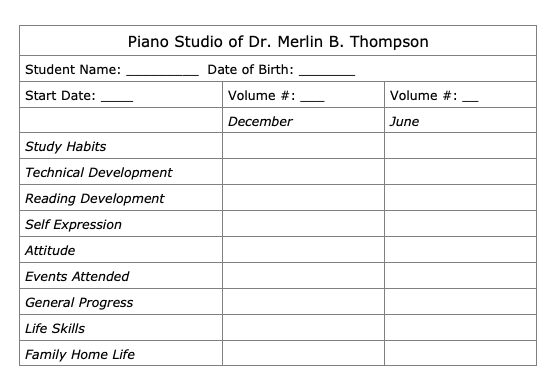With June lessons just around the corner, it’s time to think about wrapping up student lessons. For many music teachers, June is a year-end target with celebration in a formal concert and a reception for everyone. I look at June as the time to reflect on what students have done over the previous months and organize my thoughts into Student Report Cards to share with parents and students.

I have been keeping Student Report Cards for over 35 years. When I first started keeping Student Report Cards, I did so because I wanted to keep track of my students’ progress. I appreciated the practicality of Student Report Cards because, with fifty or more students in my studio, it’s virtually impossible for me to keep an accurate image of each student over long periods of time. What I never anticipated was that Student Report Cards would also provide a practical means for monitoring my own instructional effectiveness.
I appreciate how Student Report Cards have proven to be very helpful as an opportunity for me to identify consistencies and inconsistencies in my teaching. Because I keep previous and current Student Report Cards, I can get both long-term and short-term perspectives of what’s working and what needs extra attention or a different approach. I can make adjustments to my teaching at the individual student’s level and for entire groups of students in my studio.
The process I use for Student Report Cards is very straightforward. I start by reviewing an individual student’s Report Cards from previous years to get a sense of the student’s progress over time. Then I fill out the current sections on the computer. For the sections related to Students' Musical Performance, I typically select the most appropriate from: Excellent, Satisfactory, Coming Along, and Needs Work. When more information is necessary, I include a single descriptive sentence. My purpose in including Events Attended, Life skills, and Family Home Life is to get a sense of how these aspects may impact students' progress. It's not about trying to control my students' schedule, or their life skills, or their family home life. It's about shedding light on these aspects and finding ways to make adjustments when appropriate and possible. Completing Student Report Cards doesn’t usually take a lot of time - no more than 2 minutes per student. The key is that they are a starting point for discussions with parents and a record for my own instructional reflection. Student Report Cards need to contain enough information to be useful but not so much they are onerous for teachers to complete.

Student Report Cards offer a snapshot of students’ progress that differs from their weekly lessons. By looking back to previous years and comparing with students’ current status, I can see where students may be experiencing a slow down and where their progress continues smoothly. I can identify strengths and weaknesses in my own teaching. On occasion, Student Report Cards provide the professional encouragement I might need to reach out to a colleague for ideas, or consult the internet to obtain resources from other music teachers. I also appreciate how looking back at several years of Student Report Cards may provide further insight into what’s going on in my studio.
How do you feel about Student Report Cards? What aspects do you think are important to include?
